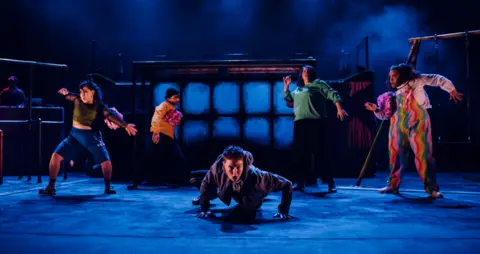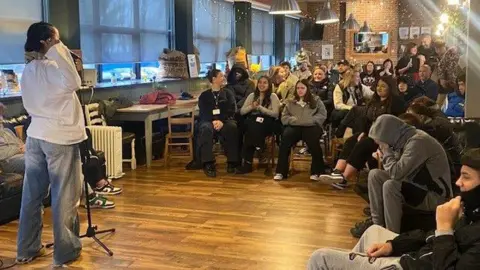 National Theatre Wales
National Theatre WalesNational Theatre Wales has come to an end.
The company says it has “ceased to exist” following the loss of all its Arts Council Wales (ACW) funding in 2023.
Naomi Chiffi, head of collaboration at the beleaguered company, called it “devastating” but came after a year of difficult self-reflection.
The company will now evolve into TEAM (Theatre, Engagement, Music, Arts), focusing on the grassroots work it has always done within the community and education.
“I think we stopped listening,” said Ms Chiffi.
“It’s been a very difficult few months to try and get our heads around, but it’s really forced us to look at what we do well and what’s most important to people.”
“I think what we have come to realise now is that it’s maybe time to let the productions happen elsewhere with other people, and hone in on what we’re really good at.”
In September 2023 the company found out it had lost its £1.6m of core funding from ACW in its investment review.

Ms Chiffi said the company had got “a lot of things wrong” but the real issue had been that it “stopped listening properly” to people within the arts sector and the public.
“What was really successful about the infancy of the organisation was that through models like TEAM, it was really listening to communities, listening to artists, listening to audiences and making work in accordance to that,” she said.
“And I think when we stopped listening to the people that we really needed to listen to, and engaging in the way that we could have, we started to make work that maybe wasn’t quite as impactful as it had been in the past.”
“I think it all boils down to: are we listening and are we actually responding to what Wales wants and needs.
“A scheme like TEAM democratises the arts, brings it to people who don’t think the arts is for them and uncovers new talent which is really exciting.”
Abena-Mintaah Mensah, a singer-songwriter and young persons’ co-ordinator at TEAM, said: “To inspire young people to be artistic and be creative is so important.”
She was speaking at a TEAM event in Cardiff celebrating the end of a project with pupils from ACT, a school for pupils outside of mainstream education.
Tobias Weatherburn, a professional actor who will take a TEAM project to Cardiff schools in January, was disappointed at the end of National Theatre Wales, but he was grateful its grassroots work will continue.
“I grew up with National Theatre Wales so it is sad, but I’m happy that TEAM will continue.”

National Theatre Wales was established in 2009 and had received Arts Council Wales funding since then.
Early successes include the groundbreaking Passion play in Port Talbot with Michael Sheen in 2011, which lasted three days and attracted 25,000 spectators.
In a letter to ACW last October, the company warned it would close without its funding, and said at the time: “If lost, it will not be easily or affordably replaced.”
ACW chief executive Dafydd Rhys said since the “difficult decision” was taken on funding, it had worked with the theatre “in terms of supporting them to reimagine and restructure to a model which is not reliant on core funding on a multi-year basis”.
Mr Rhys said the theatre was given transition funding to look at new ways of working, for example.
“We look forward to continuing our regular dialogue with National Theatre Wales as they move into this new phase in their development,” he said.
“We have also commissioned a review into English language theatre in Wales, which will be published in the spring.”


